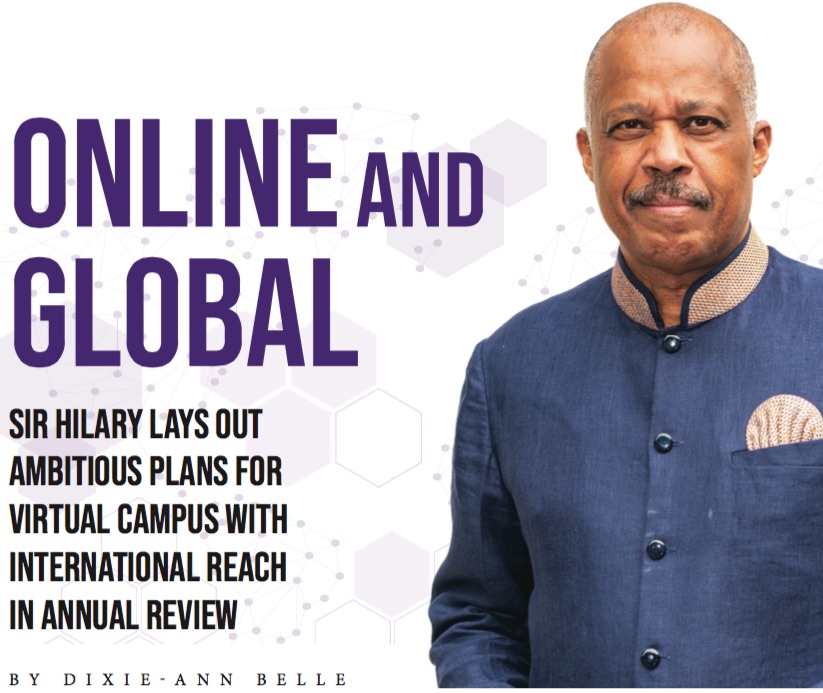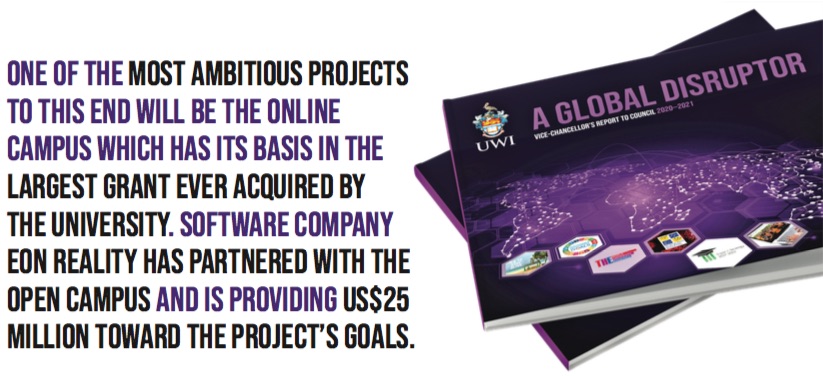
“We believe that we have finally found a coherent solution to the financial problems of this university. We believe that we have finally reached that moment where we have a strategy, a vision,” explained Professor Sir Hilary Beckles, Vice-Chancellor of The UWI at the Annual Business Meeting of the University Council on Friday 29th April. He was addressing plans for the UWI Global Online campus, a project which will soon be brought before the council for approval.
As he delivered his annual review and deliberation of the university’s business affairs, under the theme, “The UWI: A Global Disruptor: Surging in a World of Disruption”, the Vice-Chancellor noted that The UWI had successfully completed the first part of its strategic plan titled the Reputation Revolution. “Now we’re into phase 2,” he revealed, “aggressively, assertively focusing on the Revenue Revolution which will transform the internal financial health of our institution”.
One of the most ambitious projects to this end will be the online campus which has its basis in the largest grant ever acquired by the university. Software company EON Reality has partnered with the Open Campus and is providing US$25 million toward the project’s goals. The funding will be used to create a digital centre/lab which will be primarily used for the development of content using augmented and virtual reality tools. This will be instrumental in the UWI’s global online strategy of the future. “It is our intention to take the knowledge we have gained, the skill sets we have gained, and to take our content, our academic content, to the world for global distribution,” emphasised Sir Hilary.
Based on the proposed new funding model, partnerships like this will be vital to the UWI’s financial future. The Vice-Chancellor also discussed UWI’s arrangement with the communications company, Flow, which will assist UWITV in offering programming on research and groundbreaking work which affects the Caribbean.
He observed, “We have brought a new intensity to financial health discussions within our university.” He noted that one of the administration’s significant goals in this regard has been to reduce expenditure by 10 percent in 2020/2021.
Sir Hilary also detailed efforts to address deficit drivers, issues with government and student receivables, and post-employment benefits. He explained that by working with the regional governments, The UWI has facilitated a drop in government debt owed to the university. It is at its lowest in many years, decreasing from US$117 million to US$48 million.
The Vice-Chancellor also highlighted the initiative of all the UWI campuses uniting to generate significant income through entrepreneurship. Noting that “all of our campuses now have bankable products,” he declared that the goal is for these projects to generate US$50 million annually.
He indicated that the university has benefited from reparations donations. This has resulted in the Glasgow-Caribbean Centre for Development Research, the first institution in British university history dedicated to the slavery reparations policy framework. Sir Hilary commended Bridget Freeman, whose ancestors benefited from slave enterprises, who decided to donate US$500,000 to The UWI. The university is also in talks with Laura Trevelyan who would also like to donate funding as part of the reparations policy.
In keeping with the proposed new financial model, the Vice-Chancellor hopes that the governments will commit to providing 50 percent of the funding for The UWI while the university will acquire the rest through its own initiatives.
Sir Hilary also spent time recapping the university’s recent highlights. He called the events of the past year The UWI’s “finest moment”, observing that while facing the “existential threat” of the pandemic, the university performed admirably.
“We did not close our doors to our students,” he stated. “Many universities around the world closed their doors, sent home their students and staff.” “UWI’s management,” he said, had “dug deep”.
He added, “We reflected. We read the specific circumstances. We reassured our students of our fundamental commitment. We were determined that the product of this university would continue to be available to our students, and we got through with all of this.”
The Vice-Chancellor highlighted UWI’s rise to the top 1.5 percent in a global field of 30,000 universities and research institutes in the Times Higher Education rankings.
He outlined The UWI’s strategic choice to become an activist university, observing that this goal involves embracing the sustainable development objectives of the United Nations. “We will use these goals as the framework within which we mobilise ourselves to be activists within the Caribbean space.”

His words echoed those of Robert Bermudez, Chancellor of The University of the West Indies, who said in his opening remarks, ”Whatever our differences, we stand today with a shared assignment to bring the value of The UWI to the service of our students and the efforts to resolve the many urgent problems confronting the region.”
Both Chancellor Bermudez and the Vice-Chancellor touched on The UWI’s contribution to the issue of climate change. Sir Hilary elaborated on the university’s commitment to the “climate conversation”, noting that UWI experts have been dealing with the issues of rising sea levels, diminishing coral reefs, rising temperatures and more. “We were among the first whistleblowers,” he told his audience. “We were the disruptors because we have had the longest series of effective research with respect to a geographical space”.
The Vice-Chancellor also lauded the university’s public health actions like the COVID-19 Task Force, one of the first to be established in the world. He made note of The UWI’s contribution to the CDRC Diabetes Reversal Project which is working on a diagnosis and a road map for the reversal of Type 2 Diabetes, and the UWI’s joint strategy with the State University of New York (SUNY) to establish an institute for Caribbean virology research.
Noting that the university has “over-performed” in recent years, Sir Hilary declared, “We are committed and these are the reasons why we are succeeding.”